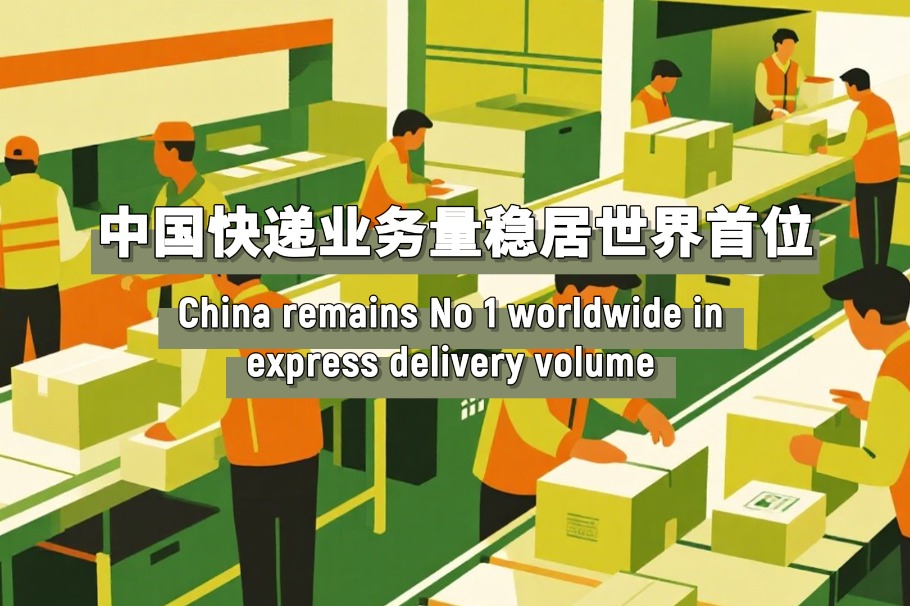China, US reach deal to extend tariff suspension





China and the United States on Tuesday extended the pause on tariff hikes on each other's goods for another 90 days, a move that market watchers and exporters said will help address trade frictions through dialogue and ease anxieties of businesses.
They said the latest reciprocal move on tariffs is expected to stabilize bilateral trade relations by injecting more certainty into markets and businesses in both countries.
The US will continue to modify the application of the additional ad valorem rate of duty on imports from China, by suspending 24 percentage points of that rate for an additional period of 90 days, starting on Tuesday, according to a joint statement on the China-US economic and trade meeting in Stockholm released by the Ministry of Commerce on Tuesday.
The joint statement added that China will also continue to suspend 24 percentage points of additional ad valorem rate of duty on imports from the US as well as related nontariff countermeasures for another 90 days, starting on Tuesday.
The sheer scale of the trade volume between China and the US last year — nearly $700 billion — speaks for itself. According to Chen Wenling, former chief economist at the China Center for International Economic Exchanges, this isn't a product of one-sided pressure. It is a reflection of deep-seated market needs and mutual economic benefit on both sides of the Pacific.
"The two countries' complementary strengths and the vast potential for cooperation are clear, but the key lies in genuine equality and good faith at the negotiating table to seek new collaboration models," Chen said.
Brad Lich, executive vice-president of Eastman, a US specialty materials manufacturer, said that stable China-US business ties would bolster business confidence and ensure the smooth flow of goods, services and technology across the Pacific, enabling companies on both sides to make long-term plans and investments.
Eager to enhance its earning strength and ramp up the output of its automotive film products, Eastman launched two production lines at its plant in Dalian, Liaoning province, in June.
Wang Wen, dean of Renmin University of China's Chongyang Institute for Financial Studies, said the world's two largest economies need to be prepared for an enduring process before sealing a final deal.
A trade agreement between them cannot be finalized as quickly as Washington has achieved with other countries, Wang said.
Even so, Tu Xinquan, director at the University of International Business and Economics' China Institute for World Trade Organization Studies, said the latest US move on China tariffs has been along expected lines.
"This outcome should also be regarded as a choice that the US side had no alternative but to make," Tu said, adding that the impact of the punitive tariffs became evident in April, prompting the Geneva talks the following month.
Sean Stein, president of the US-China Business Council, said the extension is "critical" to give the two governments time to negotiate a trade agreement and provide the certainty needed for businesses to make medium- and long-term plans, The Associated Press reported.
US-China relations and tariffs are the top concerns of US companies doing business in China, according to the annual USCBC Member Survey released last month.
Zhang Enhui, director of operation unit at Ningbo Lingyue Intelligent Equipment, a lawn mower manufacturer based in Ningbo, Zhejiang province, called the extended tariff truce a real boost for the company's confidence, given that the US accounts for more than half of its market.
"Under the pressure of tariff fluctuations between China and the US, we have leveraged every window of opportunity to work closely with our US clients this year, sustaining growth in exports to the US against the overall downward trend," Zhang said.
Driven mainly by its latest cruise-control lawn mowers, the company's exports to the US reached 423 million yuan ($58.87 million) between January and July, surging 25.49 percent year-on-year, data from Ningbo Customs showed.
In addition to recognizing China's production capacity, US companies are also paying close attention to the country's supply chain strength and innovation capabilities.
Enrique Lores, president and CEO of US technology company HP Inc, said the group still maintains a solid manufacturing base in China, with operations serving both China and multiple other countries — a plan that applies now and in the future.
HP now operates the world's largest computer manufacturing base and printer manufacturing base in China, Lores said.
Zhang Monan, deputy director of the Institute of American and European Studies at the China Center for International Economic Exchanges, said that high tariffs have directly driven up the cost of sourcing from China for many US companies this year.
"Many have been forced to import key intermediate goods via third countries, adding logistics and time costs and eroding their competitiveness in the global market," Zhang said, noting that the real cost of the trade dispute is ultimately borne by businesses and consumers alike.
Contact the writers at zhongnan@chinadaily.com.cn
































